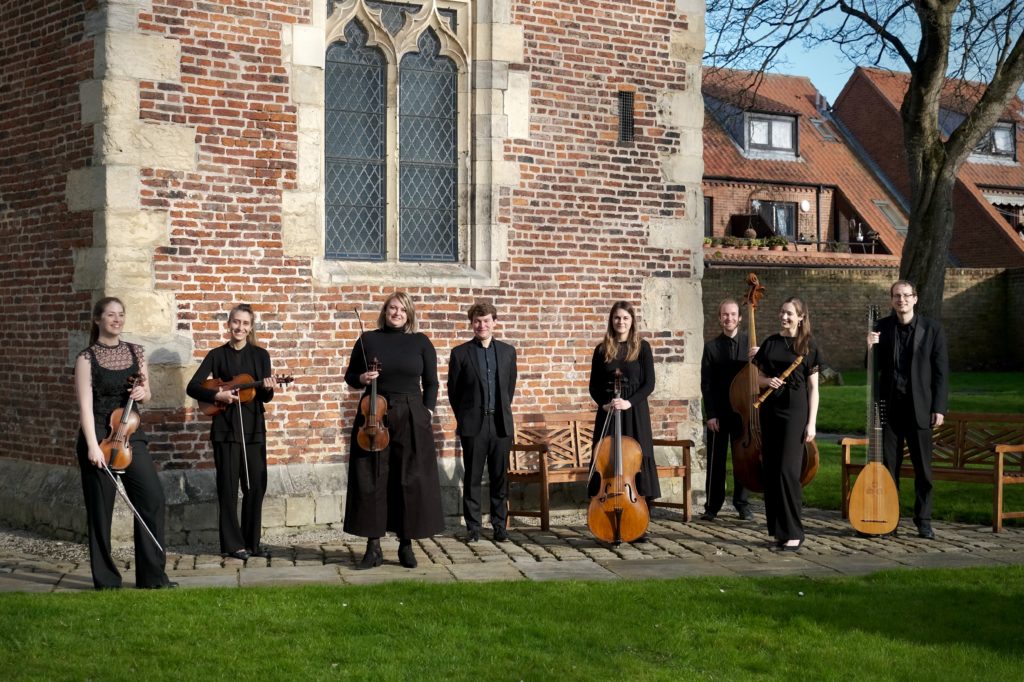
York Early Music Christmas Festival: La Palatine and Ensemble Augelletti, National Centre for Early Music, York, December 8 and 9
JUST as the nights turned chill, Early Music’s Christmas celebration in York blazed into life with two young groups determined to bring warmth. In their different ways, they succeeded.
La Palatine’s Fiesta Galante built a happy hour around two important Italian visitors to Baroque Spain, Domenico Scarlatti and Luigi Boccherini, framing them with lesser-known but equally talented locals.
Directed from the harpsichord by Guillaume Haldenwang, La Palatine’s complement includes soprano Marie Théoleyre, backed up by violin, cello and theorbo or guitar.
José de Nebra (1702-1768) is a name not as well known in this country as it should be, but he staged more than 50 zarzuela-style works in Madrid, while holding down a church job. His punchy rhythms reinforced by strumming were right up Théoleyre’s street, playing to the mezzo side of her voice.
In Nebra’s Que Contrario, Señor, which involved two arias, one song-like, one cheerful, Théoleyre delivered some tricky coloratura as she ornamented repeats, and her colleagues backed her to the hilt, especially violinist Murielle Pfister, who sometimes doubled her line.
Her style was less idiomatic, although equally fiery, in two higher-lying arias by Scarlatti, where she tended to fly off onto top notes without covering the tone.
More restrained was a trio sonata by Jose Herrando, although sunshine quickly re-emerged with Jeremy Nastasi’s account of Santiago de Murcia’s rhapsodic Marizapalos for solo guitar, which bordered on flamenco by the end. In such solo pieces, Nastasi would do well to face his audience so that his sound projects better into the audience.
A Boccherini cello sonata elicited much tricky double-stopping, which Cyril Poulet despatched briskly, especially in its central military allegro. A keyboard sonata by Scarlatti, K.144 in G (of no less than 555 that he wrote), enjoyed a smooth line at the hands of Haldenwang amid numerous deceptive cadences. A Spanish encore brought the full ensemble back into joyous life. More of that, please: it suits you perfectly.

The following evening saw Ensemble Augelletti, another quintet although all instrumental, take the stage in Pick A Card!, which highlighted some historical playing cards in the British Museum collection.
These were shown on a back-screen. They were amusing enough, although the link with the group’s Baroque programme was sometimes tenuous.
Olwen Foulkes, who is a dab hand on a variety of recorders, is the prime mover and most dominant voice among the Augellettis. But equally important to the ensemble’s success is the highly intelligent cello of Carina Drury, whose every note is attuned to what is going on around her. Her phrasing is exemplary.
She was largely responsible for the success of Bach’s Trio Sonata in G major, BWV 1039, especially in the incredibly active bass line of the concluding Presto. Its earlier Allegro had also generated terrific momentum. It was the group’s crowning glory.
Two dances from Purcell semi-operas were beautifully shaped and there was special entertainment in hearing Geminiani base his Third Trio Sonata on the folk-tune The Last Time I Came O’er The Moor.
After Handel at his most effervescent in part of a trio sonata, it was good to hear the dancing shepherds’ Piva from Messiah. It was immediately followed by Corelli’s Christmas’ Concerto Grosso, Op 6 No 8, moving gracefully from its dark opening through excitement into its closing lullaby. This was exactly what the festival needed.
Along the way we had appreciated Ellen Bundy’s lithe violin and Johan Lofving’s deft theorbo, but we had not heard quite enough from the harpsichord of Benedict Williams. Even so, this is a group whose enthusiasm is infectious.
Review by Martin Dreyer
York Early Music Christmas Festival runs until December 16. Full details at: ncem.co.uk. Box office: 01904 658338 or ncem.co.uk.
